Arabic is one of the world’s most beautiful and poetic languages, spoken by over 400 million people worldwide across 26 stunning and diverse countries. However, it’s also undeniably one of the most difficult languages to learn, particularly if you’re trying to learn Arabic at home or online without a structured course or a teacher. But like any other language, if you’re committed and open to trying different methods and techniques, mastery of Arabic is both possible and incredibly satisfying.
The following tips and hacks will help you to build an Arabic study habit into your daily routine. It’s up to you whether you want to try to apply all 12 or just pick the ones that work for you (this will depend on your goals, your level of ability and how much time you want to dedicate to your Arabic practice).
These tips will be most beneficial for those who can already read the Arabic alphabet and have a basic knowledge of the language. However, if you’re just starting out, don’t worry – there are plenty of tips and resources below that will help anyone, whether you’re a fluent linguist looking to practice or a total beginner simply looking for a place to start.
Quick tip – If you’re just starting to learn Arabic, you might want to think about whether you should learn Modern Standard Arabic or a local dialect. Don’t miss our blog post which explains the difference between them and will help you decide what’s right for you!

Here are our top 10 tips on how to learn Arabic at home, for free:
1. Set goals that are trackable and achievable
Before you do anything, make sure you get clear on WHY you want to learn Arabic. Maybe it’s because you have plans to travel the region and want to be able to converse with the locals; perhaps there’s a specific country in the Middle East that you want to visit; or maybe you need to learn for work. Everybody’s WHY is different – get clear on yours and write it down somewhere you’ll see it regularly. This will give you the sense of purpose you need to stay motivated and keep moving forward when things get tough.
Set goals that are SMART (Specific, Measurable, Achievable, Realistic and Time-bound). For example, setting a goal like “I will improve my Arabic” is too vague – get clear on what exactly you want to improve – is it your reading? Vocabulary? Speaking, listening, or writing…? And don’t overcommit – if you know deep down that you won’t have time to study for hours every day, don’t tell yourself you will!
A good goal might look something like, “I will expand my vocabulary by learning 20 new words in Jordanian dialect every week for 2 months”; or, “I will improve my comprehension skills by listening to BBC Arabic for 30 minutes every day for a month.” Your goals should be personal to you – they must reflect your WHY, and take into account the time and effort you know you can put in.
Once you’ve settled on goals that feel right to you, WRITE THEM DOWN! Did you know, studies show you’re 42% more likely to achieve your goals when you write them down? It’s also proven that people who share their goals with others are also more likely to achieve them, so tell your friends, or perhaps find an accountability partner who can hold you to your commitments. If you haven’t already, make sure you’re signed up to our private Facebook group for Arabic learners. No matter your dialect or level, it’s the perfect place to share your goals, hear tips from other Arabic students, and to find new resources and of course plenty of encouragement. Just follow this link to join us!
You should review your goals regularly and be flexible if things don’t turn out exactly as you planned. It’s better to move the goalposts slightly and KEEP GOING than to give up because you’ve fallen too far behind to catch up. Finally, make sure you celebrate your wins, no matter how small. Those little moments of success along the way will keep you moving forward!
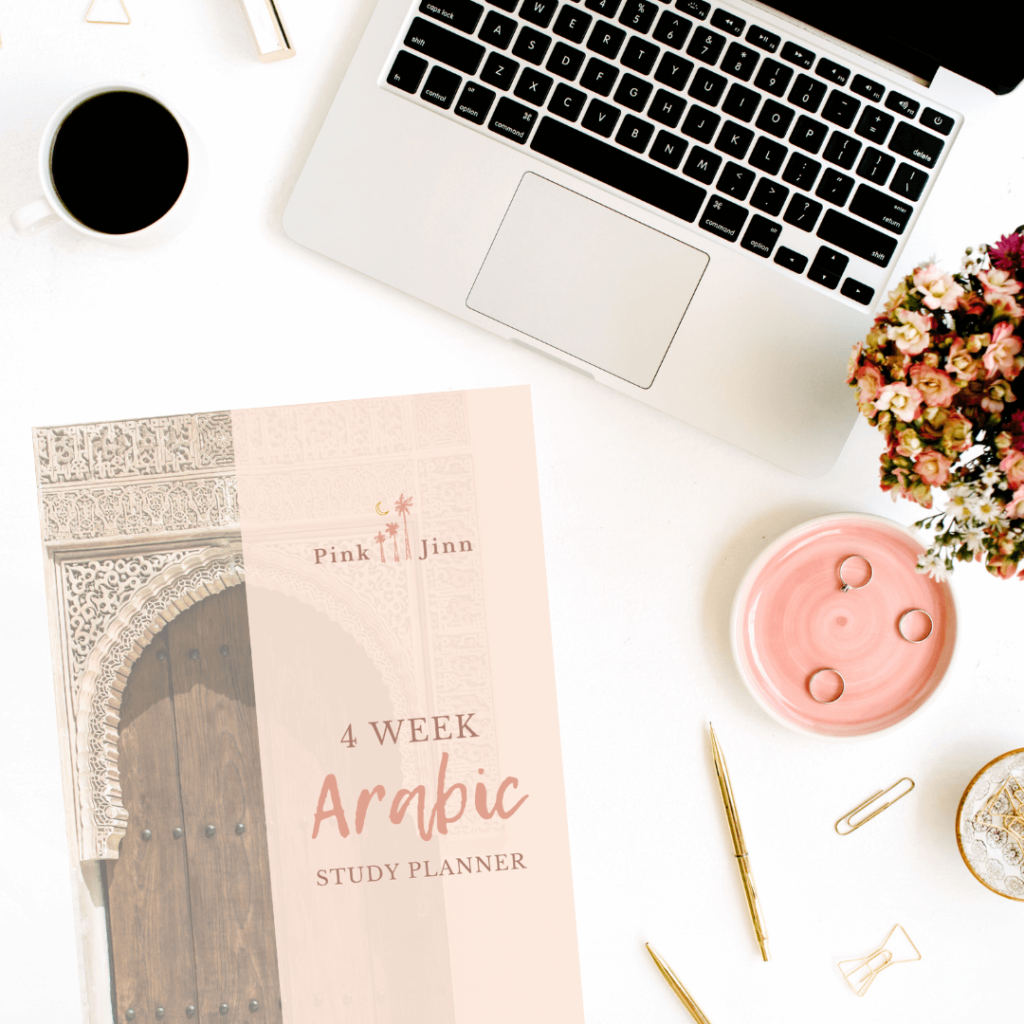
For some support setting your goals and maximising your Arabic practice, take a look at our brilliant 4-Week Arabic Study Planner. Designed especially for people studying Arabic, it walks you through setting your goals for your language learning and prompts you to review your progress and adjust your strategies accordingly. Even better, it’s downloadable and printable, so you can use it as many times as you like. Created by Arabic students for Arabic students, the planner is packed with tips, resources and guidance that will help you create a focused, effective and fulfilling Arabic study practice, whether you’re looking for something to support you through a formal course or you’re learning Arabic independently. Get yours here!
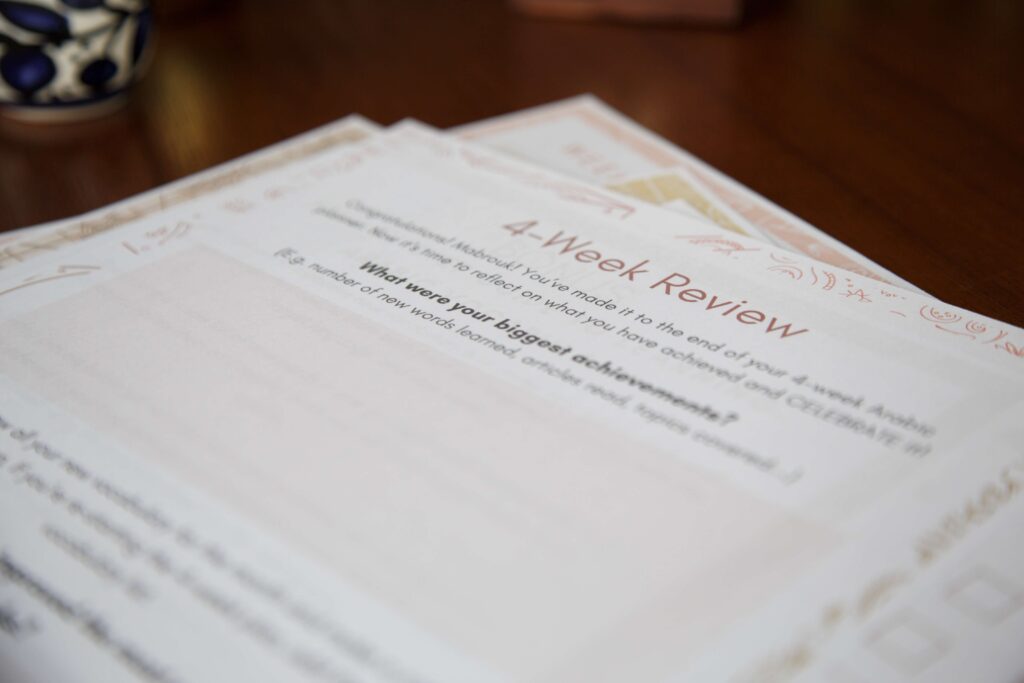
2. Use a language learning app
There are many smartphone apps available to help you build an Arabic study habit and learn on the go, many of which offer a great service for free. Here are a few we recommend:
Drops: Drops allows you to learn and practice vocabulary from a wide variety of topics with their fun and interactive, game-style app. With their free plan, you can play for 5 minutes a day.
Duolingo: Duolingo is one of the most well-known and widely-used language apps, and its Arabic offering is great to help you practice at home or on the go. Unlike Drops, Duolingo offers a little more in the way of grammar and sentence structure, and there’s no time limit on their free plan although you do need to watch the occasional ad.
Quizlet: The Quizlet app offers plain and simple vocabulary flashcards rather than a structured course or interactive games. However, it’s one of our favourites because it allows you to create your own sets of flashcards and use other people’s. It’s also great for subject-specific lists and dialects.
Memrise: Memrise goes deeper than most other apps, offering more complex grammatical and sentence structures as well as subject-specific vocabulary. However, you can only complete a small part of their courses on their free plan.
You might decide that one of these apps sounds more up your street than all of the others, or you may want to download them all and try them out for size – you’ll likely find a combination that helps you meet your specific needs. For example, we love Drops for practical, day-to-day vocab, Duolingo for general practice, and Quizlet for more niche or dialect-specific vocabulary practice.
3. Watch Arabic news and documentaries
If you want to focus on your listening skills, try watching videos from mainstream Arabic media outlets like BBC Arabic, Al Jazeera and Sky News Arabia. If you’re interested in a specific region or dialect, use Google or social media to search for local news and media platforms. Short news videos are great if you only have a few minutes to spare.
If you have a little more time, you can also find hundreds of documentaries either produced or dubbed in Arabic on YouTube – try following BBC Arabic, Al Jazeera, Vice Arabia (a brilliant and edgier outlet which covers more unique, and sometimes controversial stories than other networks), Nat Geo Abu Dhabi, and DW Documentary.
4. Immerse yourself in Arabic
It goes without saying that the most effective way to learn a language is to immerse yourself in it, but for many of us, upping sticks to the Middle East might not be an option! But don’t worry, we’ve got you covered. With so many resources available online, it’s never been easier to set up your own Arabic immersion experience right from home, no matter where you are in the world, and we’ve done all the hard work for you. Immerse yourself in Levantine Arabic or Modern Standard Arabic for a day with our FREE Immersion Itineraries!
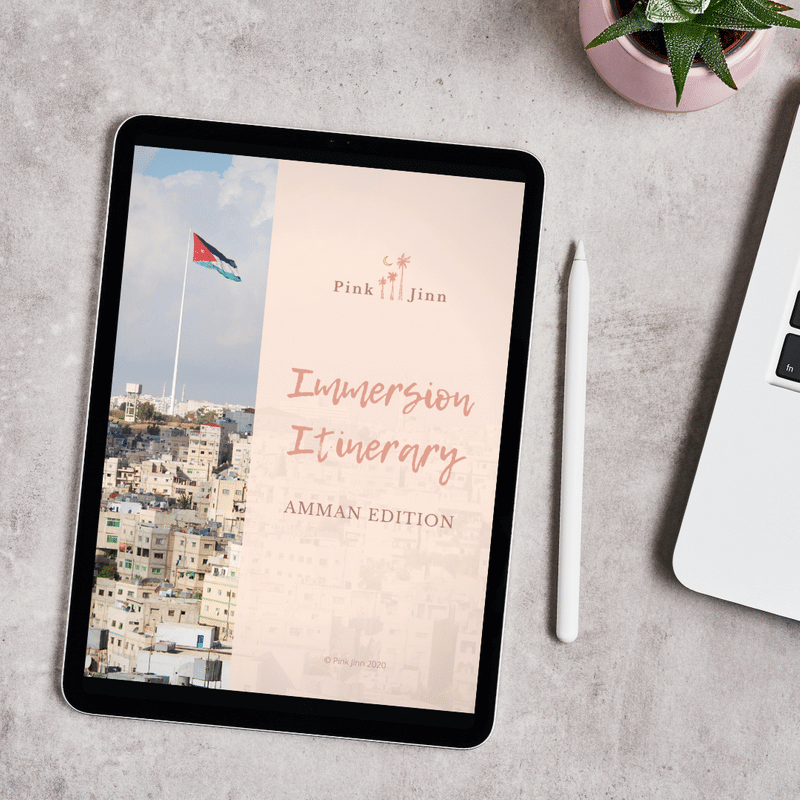
Each itinerary offers a schedule for a day packed full of Arabic practice and covers a huge range of different Arabic language resources. Choose your own adventure and tailor your Immersion Day to your own interests – whether you’d prefer to go on a virtual tour of an art gallery or kick back and play a game on your phone, you’ll be learning while you do it! Our Itineraries even fit around your 9-5, so don’t worry if you can’t set aside a whole free day. See our Modern Standard Arabic Immersion Itinerary here, or check out the Amman Edition if you’re studying the Levantine dialect!
We’ve even created downloadable PDF versions which are available for free through our Pink Jinn Arabic Learners Facebook group.

5. Read a news article every day
We can’t understate the importance of reading for improving your Arabic! There are few things more effective for improving your Arabic than simply reading a little bit every day. Depending on your level, that could be a couple of lines of an article or a Tweet, or if you’re up to the challenge, you could try reading an article a day or even an Arabic book (if you can get your hands on any).
We highly recommend trying to read an article a day, even if you don’t get past the first paragraph. Reading helps you expand your vocabulary, grasp key grammar concepts and improve your comprehension, and you’ll quickly see results across other areas of your language learning including speaking and listening.
Again, BBC Arabic and Al Jazeera are great resources, or if you’re more advanced you may want to compare and contrast articles from different outlets with different political outlooks or perspectives (for example, it’s always interesting to compare stories from Saudi news outlet Al Arabiya and Qatari channel Al Jazeera when it comes to regional politics). Or for something lighter and a little less political, you could try Vogue Arabia or regional cultural platforms like Sekka Mag.
And NO, it’s not cheating if you have Google Translate open in the next tab, but make sure you’re noting down new vocabulary! We also recommend using ReadLang – simply install in your browser and translate words and phrases you don’t know as you read!

6. Keep a vocab diary
Download your free Arabic vocabulary diary now!
This is such a simple and effective way to keep track of what you’re learning and make sure you don’t forget any new words. Set yourself a target for each week and create a list as you read or watch videos. You can even pick words from subject-specific vocab books (we recommend Elisabeth Kendall’s pocket-sized books of vocabulary on different topics such as the media, technology, politics etc.) to make sure what you’re learning is relevant to you and your why (see section 1!). Either write them down in a notebook or create your own flashcards using Quizlet (see section 2).
Now for Step 2: Set up a vocabulary learning system so all of that hard-won vocabulary actually sticks! We find that writing out newly acquired words repeatedly really helps with long-term retention. For a ready-made system you can print out and get started with straight away, download our free Arabic Vocabulary Diary! Designed especially for consolidating Arabic vocabulary, you’ll be able to print as many copies as you need. Our technique is tried and tested by Arabic students and is our favourite and most reliable method for when those vocabulary lists start to get overwhelming! Get yours for free when you subscribe to the Hump Day Newsletter!
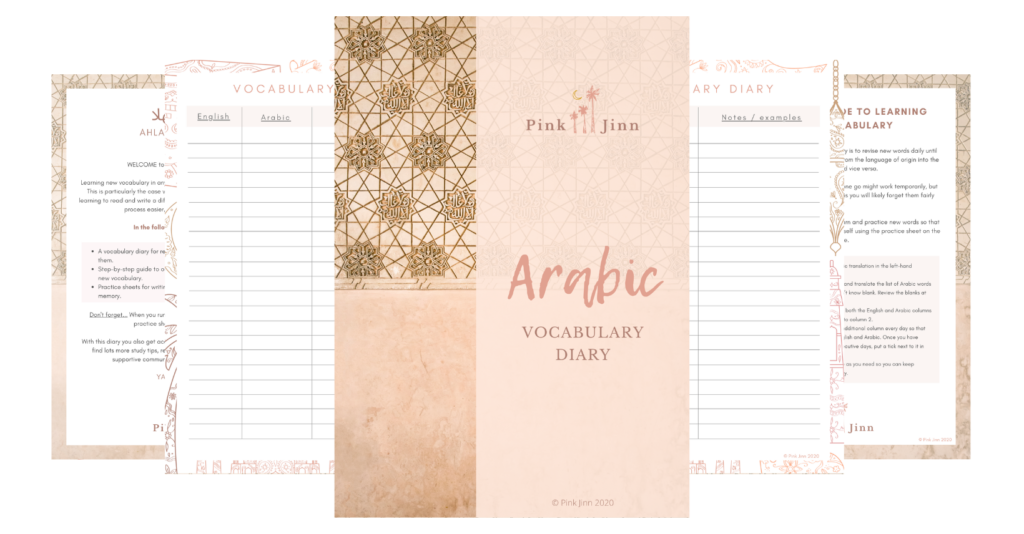
7. Listen to Arabic music and radio
Listening to Arabic, whether spoken or sung, is a great way to immerse yourself in the language and passively absorb words and phrases – particularly colloquialisms that you may not learn in a book or formal course. And with a smartphone and a few basic apps like Spotify, TuneIn Radio and Podcasts, you literally have a whole world of Arabic music and broadcasts at your fingertips.
BBC Arabic is great for listening to the news, and most of its content is in Modern Standard Arabic (fusha). Or you can choose from hundreds of Arabic radio stations from all over the region through TuneIn (download the app or listen through your browser). Top tip: if you’re learning a dialect, try listening to local radio stations using the ‘search by location’ function on TuneIn!
There are also a ton of brilliant Arabic language podcasts available, covering various topics from books and culture to politics and society. We recommend Kerning Cultures or the Hakawati network for their wide range of Arabic podcasts.
If you prefer music, try listening to these 7 Arabic music playlists on Spotify to help you immerse yourself – there’s something here for every occasion or mood! You can also find plenty of Arabic music on YouTube and Apple Music.

8. Watch Arabic TV shows and movies
Watching TV series and films in Arabic is a great way to improve your listening skills – and the best part is that it requires very little effort! Netflix has a range of binge-worthy Arabic boxsets – here are a few to get you started:
- Al-Hayba | Politics/action, Lebanon
- Jinn | Cultural thriller, Jordan
- Six Windows in the Desert | Culture/society, Saudi Arabia
- AlRawabi School for Girls | Social drama, Jordan
For more recommendations, don’t miss this round-up of our top films from the Middle East in 2022 and make sure you follow us on Instagram – we frequently post what we’re watching and reading, along with other useful online resources.

9. Add Arabic-focused accounts to your social media feeds
Most of us have been guilty at one point or another of scrolling through social media when we’re supposed to be working or doing something productive… Following Arabic speakers on social networks is a great way to keep Arabic in your head, while simultaneously easing the guilt when you go down Instagram rabbit holes!

There are millions of creatives, public figures, celebrities and influencers from the Arab World using social networks to connect with their followers, so it’s easy to fill your feed with Arabic speakers so you can learn as you scroll. You can strategically follow people from different countries to expose yourself to local dialects, or from different industries and backgrounds if you’re looking for subject specific language.
Instagram Accounts to Follow If You’re Learning Arabic

Get started by following our account for Arabic learners over at @pinkjinnarabic where we share loads of resources, vocabulary and cultural insights. And don’t miss our suggestions of who to follow on Instagram here and here! We’ve included all our favourites, from food accounts which post bilingual recipes, to micro-lessons in Emirati Arabic for Gulf Arabic learners, and some non-native Arabic speakers whose incredible language skills will impress and inspire you to keep going!
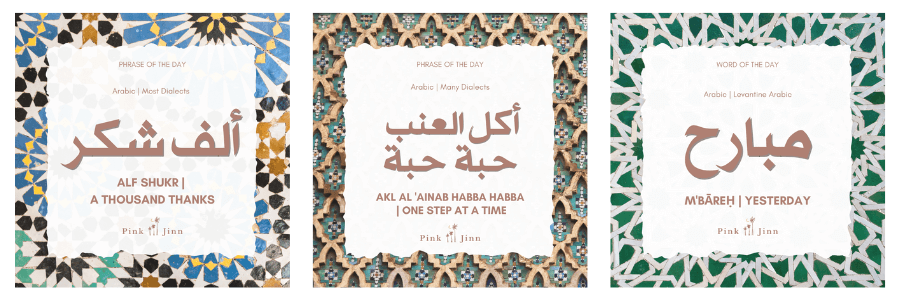

10. Learn as you browse
Have you tried the language learning browser extension Toucan? The concept is that it will replace a word or two of each sentence that you read online with the translation in your target language. Their goal is to offer ‘contextual immersion’, letting you absorb new vocabulary from the context while you go about your normal tasks online. Toucan offers both Arabic alphabet and phonetic spellings of the replaced words, so that you can adapt it to your level, and is completely free to use unless you upgrade to the premium version.
11. Find an online language partner
If you have friends or contacts in the region, why not ask around and see if they or someone they know, would be interested in a language exchange? For example, if someone wants to improve their English, you could agree to a video call once a week, speaking in English for half of the session and Arabic for the other half. That way you get to improve your conversational and listening skills without paying a penny!
Why not try looking for a language partner in our dedicated Facebook group for Arabic learners? From Modern Standard Arabic and Levantine to Iraqi and Maghrebi Arabic, you’ll find every dialect and level of Arabic represented here, so it’s the perfect place to get to know other Arabic students, and maybe even find a language buddy!

If you’d prefer a more formal arrangement and are happy to pay, you could also try using an online platform like NaTakallam, which partners Arabic students with refugees in the region. They offer both Modern Standard Arabic and some local dialects.
12. Use your smartphone settings to help you learn
Why not try switching your phone language to Arabic? Let’s be honest, we all know our way around our phones pretty well, so this will likely be easier than you think. Or if you’re not quite confident enough to do that, you could start by renaming your app folders (for example, you could rename your ‘social media’ and ‘news’ folders with the Arabic words, so you get used to seeing this vocabulary every day).
And if you haven’t already, make sure you add an Arabic keyboard on your phone (easily done in Settings) so you can get comfortable typing in Arabic. And don’t forget, just like in English, you can dictate in Arabic when typing or writing messages – this is great if you find typing in Arabic too slow or you’re not comfortable with spelling!
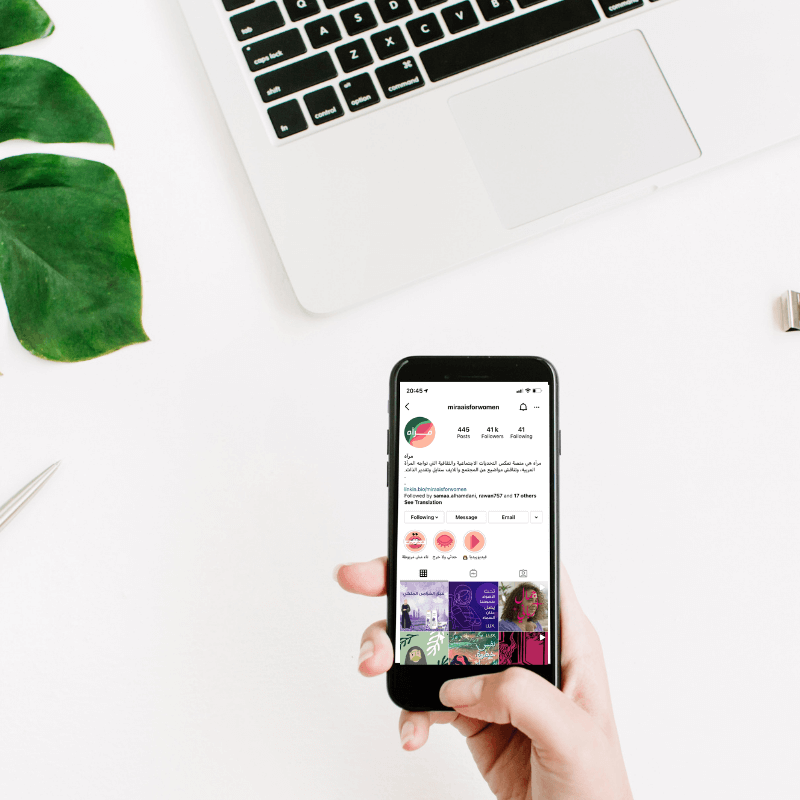
We hope we’ve given you plenty of ideas to make learning Arabic part of your daily routine! Remember, there’s no one-size-fits-all way to learn, and the most important thing is that your practice is tailored to WHY you’re learning the language. Pick and choose the tips from this list that work for you based on your WHY, your current level of Arabic, and how much time and effort you can commit to a regular practice.
We believe that learning foreign languages increases our understanding of people who are different to us, making the world a more peaceful and tolerant place. So if we can help you on your Arabic learning journey, let us know! Leave a comment and share how you’re putting these tips into practice and let us know if you have any questions or suggestions for how we can help you.

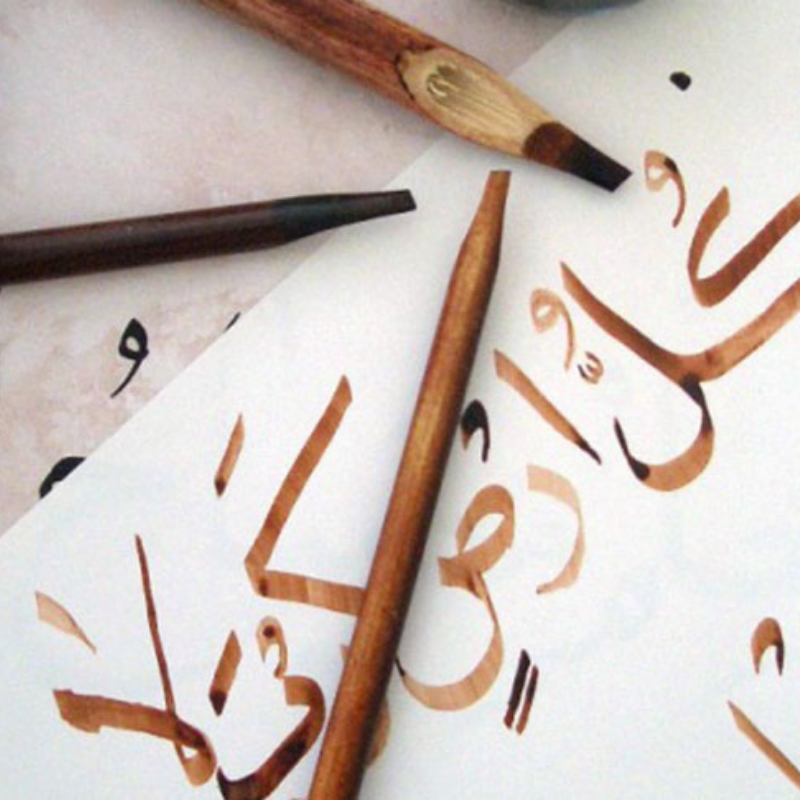



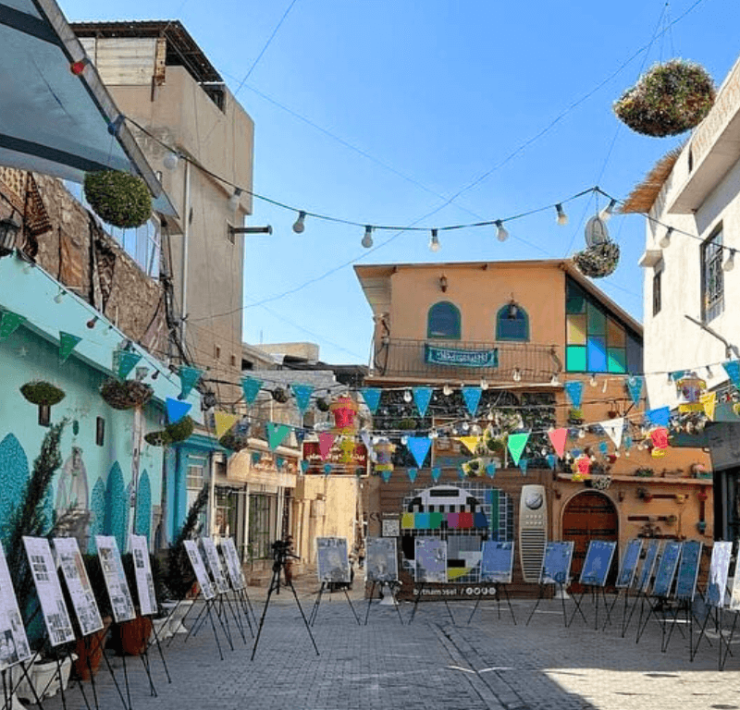

the best thing about art courses is that you can actually learn a lot of languages and different cultures. take for instance Arabic studies, you get to learn a lot if not everything about Arab counties and their culture. I have always enjoyed learning about different cultures. I never knew Arab culture was so beautiful, thanks to Arabic studies, I am now in the light. please visit my site through this link for interesting articles like this one and I will really appreciate it. thank you.
To be honest your article is informative and very helpful. After i saw your site and i read it and it help me a lot. Thanks for share your kind information.
You’re most welcome – so glad you found it helpful! Best wishes, Laura